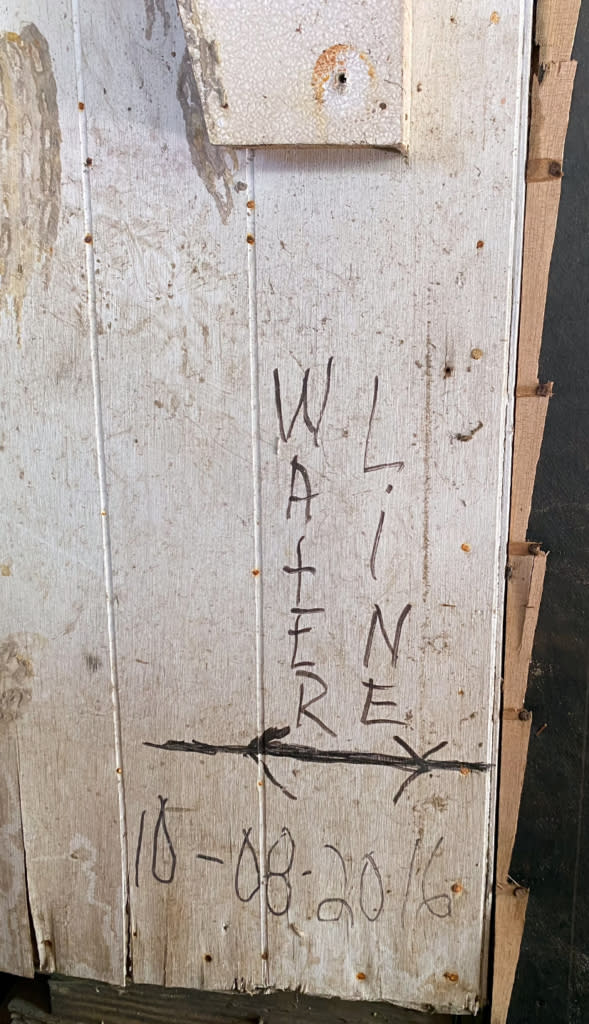After complaint filed with HUD, owners of heirs’ property prevail in dispute with ReBuild NC

Seventy-four hurricane survivors are now eligible for homeowner recovery funds, according to a settlement between Legal Aid and ReBuild NC. (File photo: Lisa Sorg)
ReBuild NC erroneously disqualified 74 hurricane survivors from its Homeowner Recovery Program because they could not prove they owned a share of heirs’ property, but those applicants are now eligible for assistance under an agreement announced April 25.
Legal Aid of North Carolina, which represented a homeowner whose application had been rejected, reached a conciliation and voluntary compliance agreement with the N.C. Office of Recovery and Resiliency, also known as ReBuild NC. The agreement includes new rules to address challenges owners of heirs’ property face when applying for recovery assistance.
Heirs’ property refers to family-owned property passed between generations of family members without a valid will or formal estate. Each heir shares legal ownership of the entire property and can maintain it through repairs, improvements, and payment of property taxes.
The complaint was filed in February 2023 with the U.S. Department of Housing and Urban Development. It alleged that ReBuild NC’s proof of ownership requirements, as applied to owners of heirs’ properties, violated the federal Fair Housing Act because they disproportionately affected and denied equal housing opportunities to Black homeowners seeking disaster recovery assistance funds. Decades of research shows that heirs’ property issues most often impact Black families, and that heirs’ properties, particularly in the South, are disproportionately owned by Black/African American landowners.
The ReBuild NC Homeowner Recovery Program administers Community Development Block Grant-Disaster Relief (CDBG-DR) funds to assist survivors of Hurricanes Matthew and Florence in rebuilding their homes.
HUD enforces the federal Fair Housing Act. Once an administrative housing discrimination complaint is filed, HUD begins investigating the allegations. During the investigation, HUD also works with the parties to try to reach an agreement, a process known as conciliation.
A.D. Skaff, supervising attorney with Legal Aid of North Carolina’s Fair Housing Project, said the resolution reduces “unnecessary barriers” for owners in heirs’ properties to access crucial relief funding to preserve existing homeownership structure to keep such properties in the family.
“We hope that these revised policies can serve as a model for other disaster relief programs in North Carolina and CDBG-DR funded programs across the country,” Skaff said.
A ReBuild NC spokesperson said the agency will mail letters to the 74 homeowners after it receives final resolution from HUD, likely in early May. The notice will explain the policy change and how it removes barriers to their participating in the program. The letter will also contain instructions for how to contact the program for a file review, should the applicant wish to pursue it, the spokesperson said.
“The ReBuild NC policy on establishing ownership of the property has evolved significantly over time,” the spokesperson told Newsline, and the Homeowner Recovery Program “was already implementing a flexible process for establishing ownership of heirs’ property before new HUD guidance offered even greater flexibility.”
In addition to allowing the 74 applicants previously rejected from the program to submit appeals for reentry into the program, ReBuild NC has agreed to implement new procedures. The agency will:
Adopt a new proof-of-ownership policy that complies with the requirements of the Fair Housing Act. Under the revised policy, owners of heirs’ property will now only need to agree that they have or will notify, in whatever way they see fit, any party that may have an ownership interest in the property about their participation in the ReBuild program, if such parties are known to the applicant.
Provide written notice of the new policy to the approximately 74 applicants previously rejected from, or otherwise deemed ineligible for, the ReBuild Homeowner Recovery Program due to previous proof of ownership requirements as applied to owners of heirs’ property.
Train staff on the requirements of the new policy. A ReBuild spokesperson said that training occurred last December and in February.
HUD will monitor ReBuild NC’s compliance with the agreement, and Legal Aid “will continue to assist our existing clients that will be impacted by these policy changes,” a Legal Aid spokesperson said.
“We commend ReBuild NC for prioritizing fair housing, implementing these new policies, and working with us to resolve this matter, so all homeowners in North Carolina recovering from devastating natural disasters have equal housing opportunities, said Lauren Brasil, co-director and managing attorney of Legal Aid of North Carolina’s Fair Housing Project.
The post After complaint filed with HUD, owners of heirs’ property prevail in dispute with ReBuild NC appeared first on NC Newsline.
